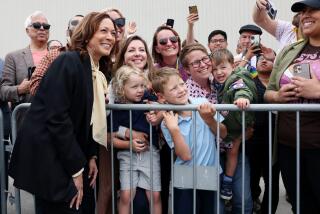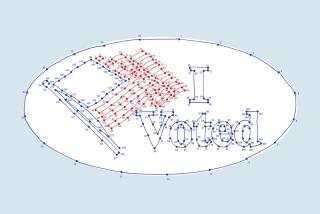Record Low State Voter Turnout Is Predicted
SACRAMENTO — California’s chief elections officer predicted Wednesday that 71% of the state’s voters would vote in Tuesday’s election, a record low for a presidential election.
Secretary of State Bill Jones said the 71% means that 11.1 million of California’s 15.6 million registered voters will cast ballots. If so, the turnout will fall below the previous record of 71.6% in 1912.
With that in mind, Jones joined seven other Western states in urging East Coast-based television networks to refrain from calling the presidential winner until polls close in the West.
Jones said his plea to broadcasters was aimed at averting a repeat of election day 1980, when millions of Westerners stayed away from the polls on hearing predictions that Ronald Reagan had won.
The time difference between the coasts permitted the networks to project Reagan the winner over incumbent Jimmy Carter, based on exit poll interviews with eastern voters. The networks were on the air with their projections three hours before polls closed in the West.
There was no indication Wednesday that the networks would delay reporting their exit polling results.
Jones announced his concerns at a Capitol news conference where he also predicted the low voter turnout. He cautioned that turnout percentages can be deceptive, noting that hidden factors have tended to skew the numbers downward for the past several years.
This year, he said, as many as 2 million names on the registered voter lists do not belong there. Examples, he said, are names appearing twice, dead people and fake names entered by voter registration bounty hunters paid according to how many names they turn in.
By factoring out the “deadwood” from the state’s registered voter pool, Jones said, his estimate of voter turnout could go as high as “81 or 82%, which would still be on the low side for a presidential election.” Having such deadwood on the rolls, he said, goes further in explaining declining turnout percentages than conventional assumptions of voter apathy.
A 1978 law repealed procedures for purging the rolls of those who don’t vote in two consecutive elections.
Because of his concerns over television predictions discouraging voters, Jones said he has banded with officials in Arizona, Oregon, Montana, Utah, Nevada, Idaho and Washington to call on the networks to withhold calling the presidential election early.
“We do object,” Jones said, to attempts by the networks to “outrun each other to predict [the outcome] based on assumptions that are not verified by actual votes cast.”
The public, he said, has a right to know an actual vote count “but does not have a right to know a prediction.”
*
In every presidential election, Jones said in a letter jointly written with the other Western officials to network news chiefs, “some 50 million Americans [in the West] are at risk that their vote may not mean as much as their fellow citizens’ who begin their day three hours earlier on the East Coast.”
A spokeswoman for CBS News in New York, Sandy Genelius, said Jones’ letter had not arrived but that, so far, the network had pledged only that it would not call the results in any state “before a majority of polls in that state have closed.”
With a vote in the East going heavily toward one candidate, those ground rules would not prevent the network from calling the race while California and the West were still voting.
The other networks did not return telephone calls.
In 1980, NBC projected Reagan the winner at 5:15 p.m. California time. Other networks did likewise minutes later, and Carter conceded defeat at 6:50 p.m.--with more than a hour to go before Western polls closed.
According to subsequent studies, up to 10% of those intending to vote decided that it was all over when the projections were broadcast. Some stayed home and others standing in line left before entering the voting booth.
In related news, Assembly Speaker Curt Pringle (R-Garden Grove) said he is investigating the voter rolls in key districts to ferret out voter fraud.
Pringle, responding to published reports, denied that he is targeting districts that have a high proportion of Latinos, a move that Democrats say is an attempt to intimidate voters and is reminiscent of a 1988 Orange County dispute involving Pringle.
The speaker’s staff is looking at potential fraud in four Assembly districts--in the Glendale, Pasadena, Marina del Rey and Salinas areas--and hopes to remove some improperly registered voters from the rolls before Tuesday’s election by reporting duplicate names.
“This is all about intimidating voters and creating a hysteria that there are hordes of folks trying to commit voter fraud,” said Assembly Democratic Leader Richard Katz of Sylmar.
*
This story is based on Times staff and wire reports.
More to Read
Get the L.A. Times Politics newsletter
Deeply reported insights into legislation, politics and policy from Sacramento, Washington and beyond. In your inbox three times per week.
You may occasionally receive promotional content from the Los Angeles Times.










